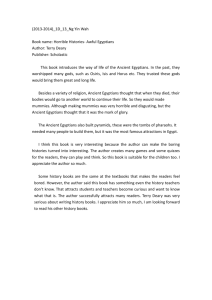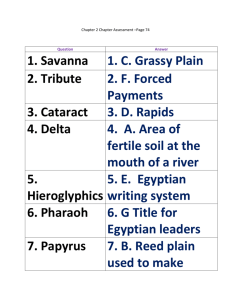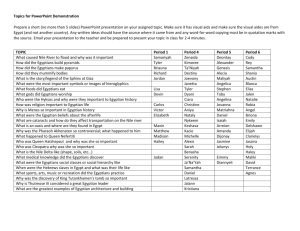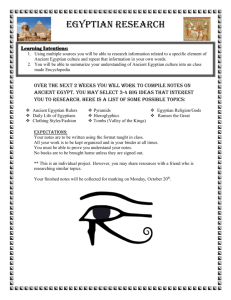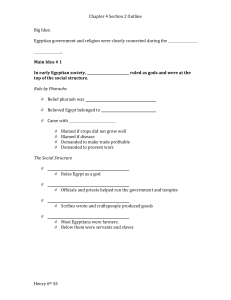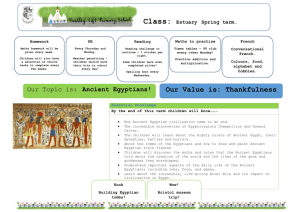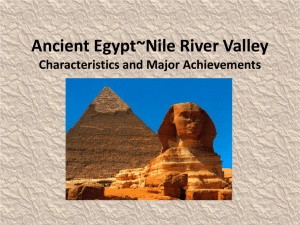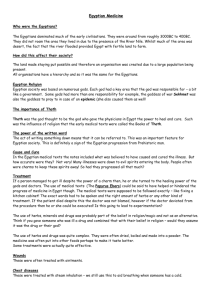Three Mortuary Texts Analysis
advertisement
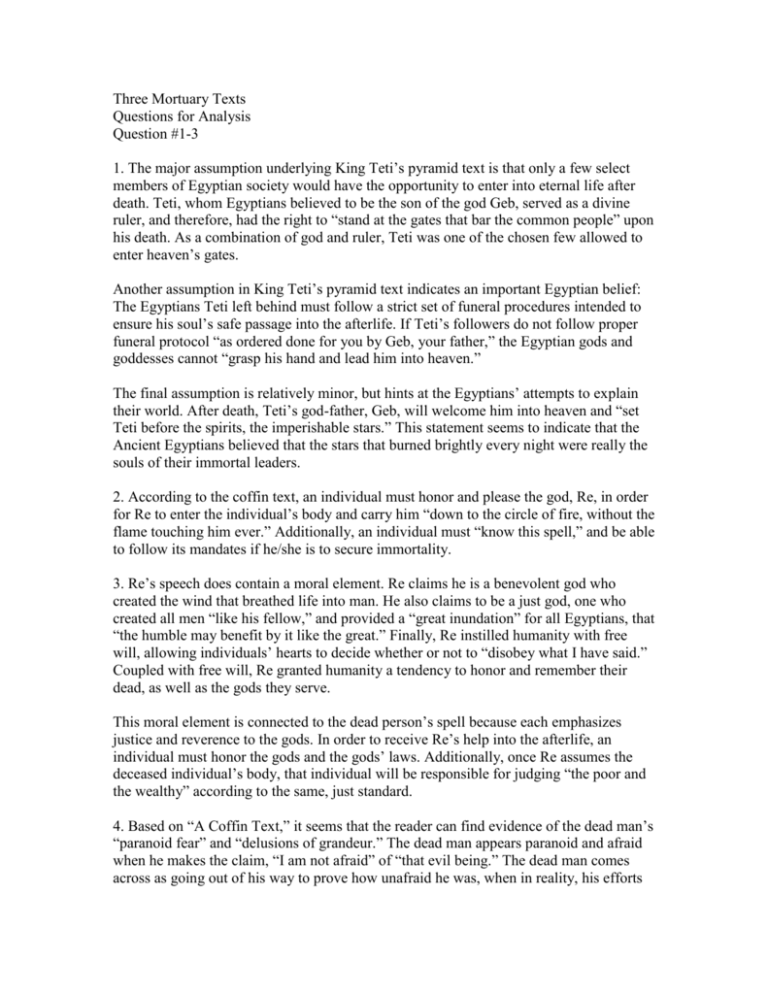
Three Mortuary Texts Questions for Analysis Question #1-3 1. The major assumption underlying King Teti’s pyramid text is that only a few select members of Egyptian society would have the opportunity to enter into eternal life after death. Teti, whom Egyptians believed to be the son of the god Geb, served as a divine ruler, and therefore, had the right to “stand at the gates that bar the common people” upon his death. As a combination of god and ruler, Teti was one of the chosen few allowed to enter heaven’s gates. Another assumption in King Teti’s pyramid text indicates an important Egyptian belief: The Egyptians Teti left behind must follow a strict set of funeral procedures intended to ensure his soul’s safe passage into the afterlife. If Teti’s followers do not follow proper funeral protocol “as ordered done for you by Geb, your father,” the Egyptian gods and goddesses cannot “grasp his hand and lead him into heaven.” The final assumption is relatively minor, but hints at the Egyptians’ attempts to explain their world. After death, Teti’s god-father, Geb, will welcome him into heaven and “set Teti before the spirits, the imperishable stars.” This statement seems to indicate that the Ancient Egyptians believed that the stars that burned brightly every night were really the souls of their immortal leaders. 2. According to the coffin text, an individual must honor and please the god, Re, in order for Re to enter the individual’s body and carry him “down to the circle of fire, without the flame touching him ever.” Additionally, an individual must “know this spell,” and be able to follow its mandates if he/she is to secure immortality. 3. Re’s speech does contain a moral element. Re claims he is a benevolent god who created the wind that breathed life into man. He also claims to be a just god, one who created all men “like his fellow,” and provided a “great inundation” for all Egyptians, that “the humble may benefit by it like the great.” Finally, Re instilled humanity with free will, allowing individuals’ hearts to decide whether or not to “disobey what I have said.” Coupled with free will, Re granted humanity a tendency to honor and remember their dead, as well as the gods they serve. This moral element is connected to the dead person’s spell because each emphasizes justice and reverence to the gods. In order to receive Re’s help into the afterlife, an individual must honor the gods and the gods’ laws. Additionally, once Re assumes the deceased individual’s body, that individual will be responsible for judging “the poor and the wealthy” according to the same, just standard. 4. Based on “A Coffin Text,” it seems that the reader can find evidence of the dead man’s “paranoid fear” and “delusions of grandeur.” The dead man appears paranoid and afraid when he makes the claim, “I am not afraid” of “that evil being.” The dead man comes across as going out of his way to prove how unafraid he was, when in reality, his efforts are a flimsy attempt to mask his paranoid fear. The dead man also claims “the scepter will not be taken from me” and “that worm shall not rebel against me,” both of which seem to reveal the dead man’s obsession with losing power. Additionally, the reader can see delusions of grandeur the dead man experiences once he believes Re has entered his body. The dead man refers to himself as “lord of eternity,” endowed with the responsibility of “judging the poor and the wealthy.” As if this isn’t enough, the dead man also refers to himself as the “maker of joy…master of action…and lord of lightland.” All of these self-referential phrases demonstrate how important the dead man believes he is once Re enters his body. 5. “The Negative Confession” alerts the reader to several important Egyptian values. Above all, the ancient Egyptians seemed to value the sanctity of human life. As a plea to gain entrance to the afterlife, the speaker notes he “has not done crimes against people…caused harm, pain, tears…not made anyone suffer…not killed (nor ordered to kill” any other individuals. This concern for his fellow citizens reveals a heavy emphasis on the right of all Egyptians to live life without fear of others. In addition to valuing life, the ancient Egyptians also appear to have valued fairness, justness, and honesty. “The Negative Confession” shows that, in order to obtain immortality, individuals must not “rob the poor, steal the cakes of the dead, cheat in the fields, add weight to the balance, falsify the scales, not take milk from the mouths of children.” Each of these mandates requires Egyptian citizens to engage in honest behavior and shows a value for fairness. Religion also seems to be an important value in ancient Egyptian life. An Egyptian citizen must be careful not to “do what the god abhors” or “blaspheme a god,” lest he face the possibility of damnation. Citizens must also not “deplete the loaves of the gods” nor “stop a god in his procession” – both of which show disrespect for the gods and deflate an individual’s chance at eternal life. Finally, “The Negative Confession” indicates that ancient Egyptians valued nature and a respect for nature’s gifts. Protected natural elements include “cattle, birds, fish, water, and fire,” and Egyptians who defiled these elements would be deemed not “pure” and needed to fear for the destiny of their souls. 6. The most obvious continuity among the three texts is the Egyptian reliance on works and procedure to gain access to immortality.

